Jonny's "Water" will be performed by the Australian Chamber Orchestra on Sunday 26th
Jonnyの新曲 「Water」が26日、カーネギー・ホールにてAustralian Chamber Orchestraにより演奏されます。
以下Programme notesより。
JONNY GREENWOOD
Water
Multi-instrumentalist and composer Jonny Greenwood joined the band Radiohead while he was a high school student in the UK, leaving his university after one term to pursue a recording career with the band for the EMI label. Originally a violist, Greenwood's early musical interests included contemporary composers like Olivier Messiaen and György Ligeti; the influence of the former is evident in Greenwood's use of the ondes Martenot, an electronic instrument beloved of Messiaen, on Radiohead's immaculately engineered album Kid A (2000), and the slewing, ondes-like string writing that creates a dissolving sheen of sound towards the end of songs like "How to Disappear Completely." Greenwood has subsequently been a composer-in-residence with the BBC Concert Orchestra and more recently with the London Contemporary Orchestra. He has composed in a variety of classical genres, and was nominated for Breakout Composer of the Year by the International Film Music Critics Association in 2007. His film scores include Bodysong, There Will Be Blood, Norwegian Wood, We Need to Talk About Kevin,and The Master.
Water is the result of Greenwood's collaboration with the Australian Chamber Orchestra during his residence with the ensemble in 2013. Writing in The Guardian, Greenwood described composing "for concerts instead of recordings, which is a new way of thinking about music for me ... I love the impermanence of the music live: It's played in the room--which is itself infinitely variable from one concert to another--and then it's gone, soaked into the walls. Unlike recordings, it isn't identical to the previous performance or the next one."
Water is scored for piano and synthesizer, two flutes, two tanpuras (which are played in this performance by one musician on one tanpura, with the sound of the second instrument produced electronically), and strings. The score includes a superscription from British poet Phillip Larkin's short lyric poem "Water" from The Whitsun Weddings. The poem begins:
If I were called in
To construct a religion
I should make use of water.
It ends with an image of a glass of clear water:
Where any angled light
Would congregate endlessly.
Greenwood's work begins with five overlapping ostinatos, or repeated figures, in 6/4 time in the violins and keyboard. Each figure is restricted to a few notes from the C-major Lydian scale, and the texture, while active, is essentially consonant, like ripples in water. Also added are long notes in the lower strings and tanpuras, outlining the C-major tonality in free rhythm. Flutes and violas add chromatic coloring, and ornate figures from the solo first violin lead to the work's first climax. The section continues with the full string section contrasting with lighter ensemble episodes, increasingly elaborate solo writing, and an exploration of the icy timbre of string harmonics. This last sound is used for a passage where the players are given rhythmic freedom to create glinting pile-ups of sonority.
The following section begins with a simple but dissonant two-part idea in 3/8 that gathers in intensity and volume as it spreads through the orchestra. This is followed by a section of extended techniques for the strings, such as bowing behind the bridge and striking muffled strings with a guitar pick. These provide new rhythmic ostinatos that lead to a texture of simple rhythm and close chromatic harmony. The final section is in a slow 3/8, where cluster chords swell and recede in the orchestra's middle register, the tanpuras progressively detune, and the faster phrases in the keyboard, winds, and upper strings make use of note-bending. This section, like earlier passages in free rhythm, creates an effect of deliquescence, illustrating both Larkin's image of light and water, and Greenwood's cultivation of the ephemeral nature and infinite variability of live performance.
--Gordon Kerry
Jonny's new work, Water, will be performed by the Australian Chamber Orchestra on Sunday 26th April at Carnegie Hall http://t.co/9kiYglvMKx
-- Radiohead (@radiohead) 2015, 4月 23

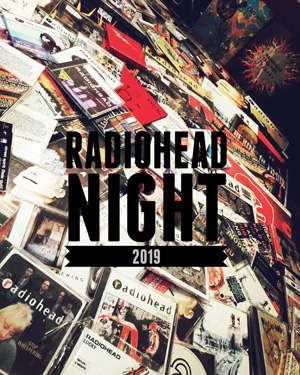
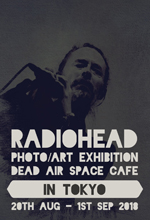
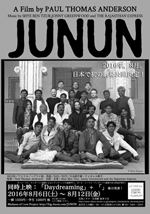
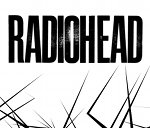

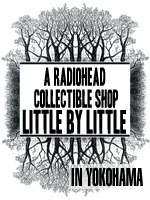
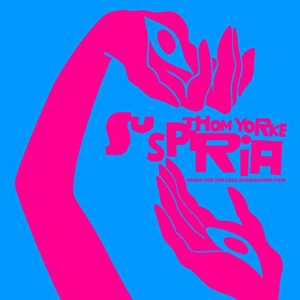
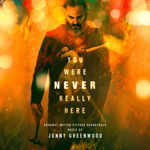
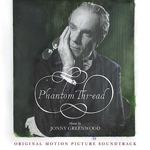
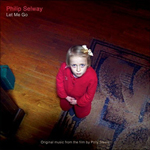
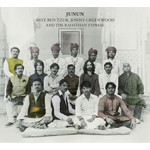 Shye Ben Tzur,Jonny Greenwood and the Rajasthan Express - JUNUN
Shye Ben Tzur,Jonny Greenwood and the Rajasthan Express - JUNUN